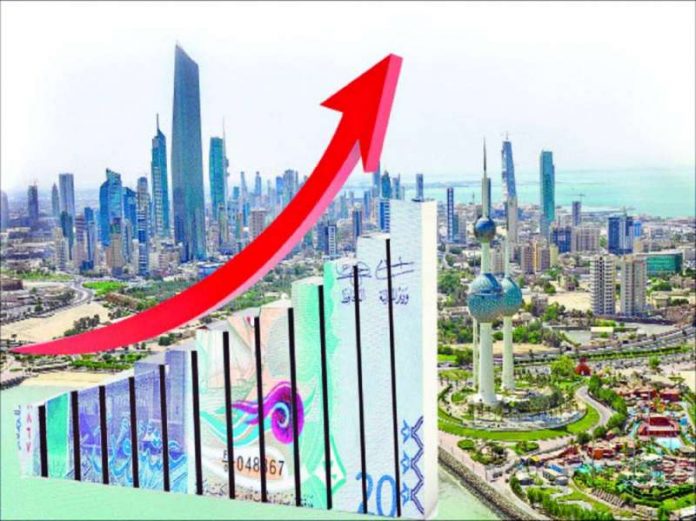The Institute of Chartered Accountants in England and Wales (ICAEW) expect Kuwait to record the highest real GDP growth among the Gulf countries this year, reaching 2.5 percent on an annual basis.
The forecast for Qatar is 2.47 percent, Saudi Arabia 2.3 percent, Bahrain will record 2.16, Oman 2.13 and the UAE 1.6 percent.
In a report on economic development in the Middle East, the institute said the outlook for the region has improved in the past few months, with the recovery accelerating in the third quarter, supported by rapid vaccination campaigns, easing virus-related restrictions and increased oil production.
The report added, “It seems the economies are now ready to return to the pre-pandemic times by the end of 2021 at a time when the delta mutator is causing concern globally, reports Al-Rai daily quoting ICAEW.
The regional GDP is expected to grow by about 2.6 percent this year, 0.2 percentage point higher than the institute forecast 3 months ago.
The report pointed out at the global level the Gulf economies have benefited, noting that the positive momentum will continue until 2022 with the increase in oil production.
The report ecpects the GDP of the Gulf Cooperation Council countries in the first quarter of 2022 will return to pre-crisis levels, with an acceleration in GDP growth from 2.2 percent this year (0.1 points higher than what the institute expected 3 months ago), to 5.1 percent.
The Institute stated the region showed a continuous expansion in the non-oil sector with an improvement in the business environment on the background of accelerating vaccination campaigns and a high rate of global growth.
The report also said the main measures of production, new business and employment indicate further recovery, and that preparations for various regional events, such as the Expo 2020 in the UAE and the 2022 World Cup in Qatar, and the bold investment strategy in Saudi Arabia, also support the expansion of the activity.
The report pointed out in general, the institute’s expectations for the Gulf countries show non-oil growth of 3.1 and 3.9 percent this year and next year, respectively, noting that while oil production cuts affected overall production, the oil sector will accelerate next year after the OPEC agreement on the increase in production levels.
The report stated that the dynamics of the oil sector is a supportive factor for the financial conditions of the Gulf Cooperation Council countries, given that 40 to 90 percent of their total revenues come from oil, as this is good for government income, which may translate into investment, consumer spending and non-oil growth.
The fact that governments are currently focusing on fiscal reform while spending remains constrained, the institute expects the region’s total budget deficit to shrink to less than 2 percent of GDP for this year, the smallest gap since 2014.
The report finds that inflation in the GCC has reached its peak, despite the rise in food and shipping costs globally, stressing that with the fading of the main effects of the value-added tax increase in Saudi Arabia last year, annual inflation there fell sharply in July.
The report expects the GCC countries to contain what it called the ‘price pressures’ in the coming months even as the housing inflation and weak demand fade away and the rises in producer prices are transmitted to consumers, adding, “In general, the regional inflation rate will reach 2.9 percent this year, before it declines to below 2 percent over the next two years.
The Institute’s report states that given low inflation, central banks in the region, unlike many emerging markets, do not have to worry about higher interest rates in the near term, noting that these countries are moving in the same direction with the United States to protect currency pegs.
The report predicted interest rates in the United States will rise only in 2023, with the domestic financing costs in the GCC countries remaining low for the time being.

















